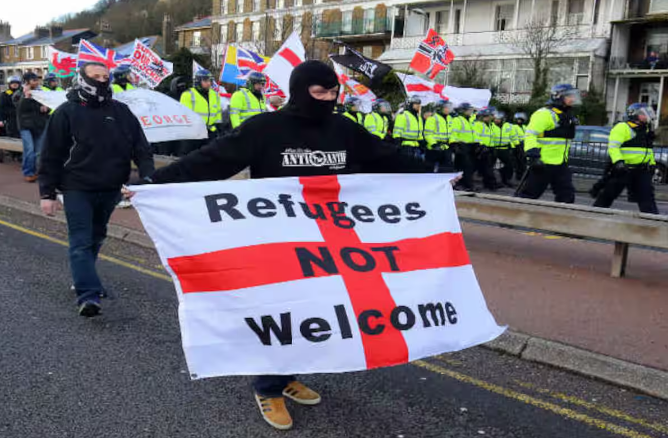The United Kingdom is facing an increasingly tense situation as anti-immigrant violence continues to spread, leaving innocent refugees physically and emotionally scarred. The unrest, driven by misinformation following a tragic stabbing incident in Southport, has led to significant harm to refugee communities across the country, particularly in cities like Liverpool, Birmingham, and Bristol.
Refugees Under Attack: Cities Hit Hard
In Liverpool, several refugees have reported physical assaults, with their homes and temporary shelters being targeted by rioters. Birmingham has seen similar violence, with refugees being harassed and forced to flee their accommodations. In Bristol, the situation has been dire, with property damage to refugee centers and intimidation tactics leaving many asylum seekers in fear for their lives.
The financial damage has been considerable as well. Mosques, hotels housing asylum seekers, and businesses owned by immigrants have been looted and vandalized, exacerbating the sense of insecurity among refugee communities.
Police Response Under Scrutiny
Amidst this violence, the response of British police has come under intense scrutiny. Many in the refugee community feel that the police have been negligent in providing adequate protection. A glaring example is the attack on a refugee hotel in Rotherham, where rioters were able to cause significant damage before police intervened. Critics argue that the slow response time and lack of preventive measures have left refugees vulnerable to further attacks.
Refugee advocates have raised concerns about the lack of police presence in certain areas known to house large immigrant populations. The perceived failure to act swiftly and decisively has led to questions about whether law enforcement is doing enough to protect these vulnerable communities.
Psychological Impact on Refugees: A Growing Crisis
The psychological toll of these events on refugees, particularly women and children, is profound. Many refugees have fled war-torn countries and are now re-traumatized by the violence and hatred they face in what was supposed to be a safe haven. The constant fear of attack and the experience of witnessing violence have led to widespread anxiety, depression, and post-traumatic stress disorder (PTSD) within these communities.
Children, in particular, are at risk of long-term psychological damage. The fear and uncertainty they face can hinder their ability to integrate into society, impacting their education and overall well-being. The trauma of living through such events can leave deep emotional scars, affecting their development and sense of security for years to come.
What is Expected from the British Government?
In light of the ongoing violence and its impact, there are growing calls for the British government to take more decisive action against right-wing extremism and those who provoke such hatred. Advocates are urging the government to implement stricter laws against hate crimes and to ensure that those who incite violence are held accountable.
There is also a demand for increased support for refugee communities, including better mental health services and stronger legal protections. Community leaders and human rights organizations are calling on the government to prioritize the safety and well-being of refugees and to take a clear stand against the rhetoric and actions of far-right groups.
Prime Minister Keir Starmer has condemned the violence as “far-right thuggery,” but there is an expectation that his government will move beyond rhetoric to concrete action. This includes enhancing police training on dealing with hate crimes, increasing funding for community integration programs, and ensuring that refugees have access to the resources they need to rebuild their lives in the UK.
As the situation remains volatile, the government’s response in the coming days and weeks will be critical in determining whether the cycle of violence and fear can be broken.




